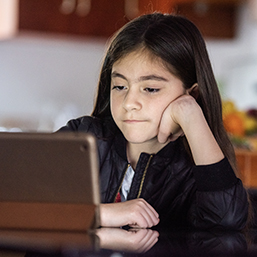
The news headlines today have increased the level of stress in our lives. Whether the impacts are direct or indirect, increasing stress can increase your level of anxiety. Constant exposure to the news will increase your stress and has real risks on your mental health. This has been described as “media saturation overload,” “doomscrolling,” or “headline anxiety.”
\n \nThe more time you spend following the headlines in the news and on social media, the more negative inputs flow into you and to your child’s day, which will ultimately increase anxiety. Even if you limit your own news exposure to a minimum at home, your children will still be exposed to world events through school and friends.
\nLimiting stress and anxiety
\nHere are some tips on how you can have age-appropriate discussions about world events while limiting stress and anxiety.
\n1. Limit your news intake. Reducing exposure to this source of stress will limit its impact on anxiety levels. Pay attention to the news your children are consuming and limit the amount of time spent consuming news for all family members.
\n2. Age-appropriate news sources. Visiting age-appropriate and reliable news sources can help put events in terms your children can better understand.
\n3. Teach critical thinking. Teach your children to think critically about what they see online and how to differentiate reliable sources from misinformation. Talk to your children about the reality and likelihood of events in the world having a direct impact on their lives. Differentiate things that are in their control and things that are out of their control.
\n4. Encourage open communication. Give your children a safe space to express their fears, worries, and frustrations. Listen to your children and let them know you’ve heard their concerns and validate their feelings.
\nPositive action
\nAs a parent and as a family, there are positive actions you can do to counteract the level of stress that world events can impose on your life.
\n1. Maintain routines and stability. Keep a predictable schedule in your day as much as possible to increase a sense of safety. Make sure to maintain healthy habits (sleep, nutritious eating, regular exercise, and self-care).
\n2. Healthy coping. Counteract negativity through healthy actions that reduce stress. Spending time in physical activities (sports, walking, biking), creative activities (art, music, hobbies), and outdoor activities.
\n3. Mindfulness & relaxation. Teach deep breathing, meditation, or relaxation exercises to help your children manage stress.
\n4. Strength finding. Recall something hard your child has gotten through before and the strengths and resources they have relied on in the past do hard things.
\n5. Be a positive role model. Model positive self-talk and problem-solving for your children. Model ways to handle stress positively (e.g., "I’m feeling overwhelmed, so I’m going to take a walk.").
\n6. Nurturing social connections. Spending time through activities with friends and family. Taking part in community clubs and activities.
\n7. Kindness missions. Do something nice for someone else (e.g., drawing a picture to make someone smile, baking and sharing a treat, doing a chore without being asked).
\n8. Activities that make a positive impact. Find family activities that produce a positive change in your family and community like gardening, building, and volunteerism.
\n9. Activism. You and your family may feel inspired to get involved and can join a political demonstration, engage with elected representatives, and serve others impacted by political decisions.
\nDespite your efforts, you may find that you or your children still may require professional help. If stress or anxiety becomes overwhelming, don’t hesitate to seek counseling or therapy. Watch for signs of deeper struggles, like withdrawal, drastic changes in behavior, or persistent sadness.
\nBooks, apps, and website resources
\nYoung children (Ages 3 to 6)
\nChildren (Ages 7 to 10)
\nTweens (Ages 11 to 13)
\nTeens (Ages 14 to 18)
\nApps
\nNews for Kids
\nActivism
\n\n
Dr. Harriet Johnston is a registered psychologist in Calgary. She works at the Eckert Psychology & Education Centre where she provides child, adolescent, and adult assessment, as well as solution focused therapy to individuals, couples, and families. She also runs a solo private practice, Cowtown Psychology.
\nAnderson, B. (2025). Media Excess & Mental Health, Psychiatric Times, 42, p. 5-6.
\nHuff C (2022). Media overload is hurting our mental health: here are ways to manage headline stress. Monitor on Psychology. 53, p. 20.
\n\n
See our related articles:
\n
Calgary’s Child Magazine © 2025 Calgary’s Child